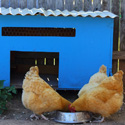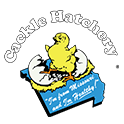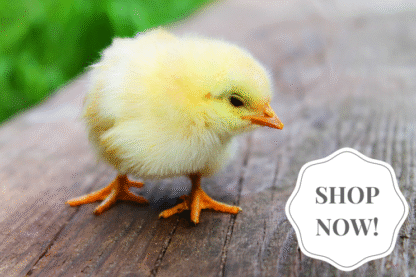
Debate rages over whether it’s better to feed and water chickens inside the coop or outdoors in the run. The right answer depends on a number of factors, including how big the coop is in relation to the flock size, whether or not the chickens are confined indoors overnight and for how long, how secure the run is, and what the weather is like. Let’s take a look at some of the pros and cons for each option.
Feeders Inside
Among the benefits of keeping feeders inside the coop is that the feed remains dry in inclement the weather. Wet feed is subject to mold and other spoilage issues. Another benefit is that it encourages the chickens to come indoors at nightfall to grab a snack before going to roost, which in turn encourages them to roost indoors where they are better protected from night prowling predators.
On the other hand, keeping feeders indoors means the chickens spend more time inside during the day, soiling the litter that therefore needs to be cleaned more often. Indoor feeders also attract rodents to pilfer feed during the night. Rats are especially problematic — chickens get nervous when they know rats will be scurrying around beneath the perch all night.
Feeders Outside
An advantage to keeping feeders outside the coop is that the chickens are encouraged to spend more time outdoors, enjoying the benefits of exercise and fresh air, and those free range chickens produce more nutritious eggs. Outdoor feeders also free up more space inside the coop for the chickens themselves, which can be an important issue for a family flock housed in a small backyard coop.
Having feeders outside in the run may encourage pilferage by wild birds during the day and by rodents and other wildlife during the night, and some of the wildlife attracted by feed may be poultry predators such as raccoons, opossums, or bears. In bad weather, feed may get wet, causing mold and other types of spoilage. An outdoor feeder therefore needs to be secured from pests and predators, and sheltered from weather.
Drinkers Inside
The first thing chickens do when they come down from the roost in the morning is get a drink. A waterer inside the coop provides easy access, and also makes it easier to use a water heater to keep it from freezing in cold weather.
On the down side, drips and spills that dampen bedding require a greater degree of litter management. The more crowded the coop is, the more likely drips and spills are to occur and the more work will be required to keep the litter properly dry and healthful.
Drinkers Outside
Having drinkers outdoors in the run encourages more outdoor activity and also makes more room inside the coop for chickens. Providing an extra waterer outdoors is essential in extremely warm weather, because it encourages chickens to drink more and remain hydrated.
On the other hand, outdoor waterers require having a sheltered area to protect thirsty chickens from bad weather, and even then the waterers are more difficult to keep bacteria- and algae-free, and to keep cool in summer and prevent freezing in winter. Left out overnight, water attracts rats and other wildlife. If the only water stations are outdoors, chickens should not be confined indoors with feed but no water, since they need water to digest the feed.
Bottom Line
Some chicken keepers provide feed and water stations outdoors only. Many have them indoors only. Some people provide both, which gives chickens an opportunity to eat and drink whenever they choose, and also gives meeker flock members more options for grabbing a sip or snack without being bullied.
Some chicken keepers move the feed and water stations outdoors during the day and indoors for the night. Chickens don’t eat or drink in the dark hours between dusk and dawn, a time during which they are asleep on the roost. But they do eat and drink first thing in the morning and last thing before going to roost. Chickens therefore should have ready access to feed and water during those peak feeding times.
And that’s today’s news from the Cackle Coop.
Gail Damerow, author, Storey’s Guide to Raising Chickens



Great info & help! Thanks!